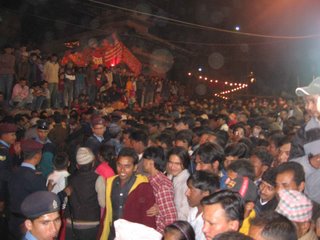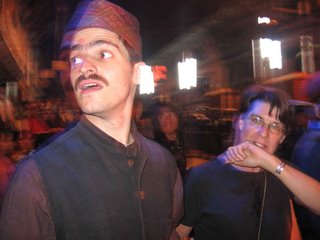The King's Motorcade
An ocean of people surge like a tidal force, and we dive in. At Pashupatinath, a quarter million people have converged for Shivaratri, the night of Shiva, and we are among them. People have come from all over the Kathmandu Valley to pay homage to Shiva at one of the most important Shiva temples on the Indian Subcontinent, and Sadhus (wandering ascetic holy men) have made pilgrimage from all over to worship Shiva and take their Prasad, Ganja, the Breath of Shiva.
 People are packed into the narrow streets between the buildings. Every street that we try, people seem to be blocking the way, welled up like a dammed river. Once again, we go down a street and find it blocked, so we push our way into the crowd. We are overwhelmed, and we find ourselves lost into the hot heaving throng. We are three people together, Deborah, Jiwan and Mark, and we would like to remain that way, so we grip each other’s hands like a lifeline.
People are packed into the narrow streets between the buildings. Every street that we try, people seem to be blocking the way, welled up like a dammed river. Once again, we go down a street and find it blocked, so we push our way into the crowd. We are overwhelmed, and we find ourselves lost into the hot heaving throng. We are three people together, Deborah, Jiwan and Mark, and we would like to remain that way, so we grip each other’s hands like a lifeline.
In a crowd like this, people lose their autonomy, subjugated to the will of the herd. The force of the movement is overpowering, and repeatedly I found myself pushed, lifted, off-balance, feet barely touching the ground. Initially I fought the force, gritting my teeth, and it was painful and difficult. I seemed to get pushed, elbowed and kicked from every direction. Finally, I found it easier to relax into the undulations of the crowd, following the flow, and it became calming, like a sigh, and time seemed to disappear. We floated downstream in the swirls and eddies of the turbulent current.
Abruptly, we crash into a wall of blue-suited officers with sticks and rifles, the dam holding back the force of the surge, a crush of men on men. The feeling changed instantly from security to hazard. The sudden hardness posed a threat of injury.
Fortunately, one of the officers in the line spotted Deborah, one of the only women in the crushing crowd, and a foreigner at that, and he signaled to her to break through the line. Jiwan and I were attached, so we followed, and we were delivered again to safety.
 Once free from the crush, we were able to gain our bearings, and the police who were not on the front lines chatted amicably with us, as Nepalis are wont to do. Upon questioning the reason for the barricade, we found out that the king was coming. He had come to do Puja, to give worship to Shiva, and his motorcade would be coming through any minute. We were trapped between the crowd and the King, in the stifling dusty street.
Once free from the crush, we were able to gain our bearings, and the police who were not on the front lines chatted amicably with us, as Nepalis are wont to do. Upon questioning the reason for the barricade, we found out that the king was coming. He had come to do Puja, to give worship to Shiva, and his motorcade would be coming through any minute. We were trapped between the crowd and the King, in the stifling dusty street.
We stood by the sidelines and chatted with the police for half an hour. The crowd was quite a spectacle, and the crowd control likewise. We would be standing on clear pavement and, over the course of some minutes, the crowd would slowly surround us, and we would once again be in its midst. Then, at some hidden signal, the police would charge the crowd back with their sticks, as we clung to a fence, and we would once again find ourselves in safety. We were given preferential treatment as foreigners, as guests, and we were grateful for it. Besides, the police took a liking to me, a foreigner who spoke Nepali and dressed like a Nepali, “Nepali justi” - just like Nepali!
At a lull in the action, we decided to make a break for it, to escape from our trap. Jiwan asked a police officer whether there was any way out, and nobody seemed to know. There was a side street, and we decided to try and make a run up the street away from the crowd, and go home. As we scooted around the corner, a huge crowd bore down on us, people stacked on top of each other, and we realized that the trap was complete. Here we were, and here we were to stay. We found ourselves at the heart of the activity, with crowds on all sides, police and authority figures coming and going, and two police horses which would occasionally make spinning kicks to clear away gathering crowds.

Finally, after an eternity, in a flurry of flashing red lights, from the main gate came motorcycles and blue trucks brimming with armed soldiers. The crowd hummed with tension. A swarm of dignitaries approached, carrying briefcases, wearing Nepali suits, and then…the king walked by.
We were enveloped in the choking fumes and dust of the motorcade, and crushed once again by the crowd, and after some minutes, we were taken up in the outflowing current of the masses. We were deposited onto the free streets, where we made our way home, exhausted, grimy and euphoric.
 People are packed into the narrow streets between the buildings. Every street that we try, people seem to be blocking the way, welled up like a dammed river. Once again, we go down a street and find it blocked, so we push our way into the crowd. We are overwhelmed, and we find ourselves lost into the hot heaving throng. We are three people together, Deborah, Jiwan and Mark, and we would like to remain that way, so we grip each other’s hands like a lifeline.
People are packed into the narrow streets between the buildings. Every street that we try, people seem to be blocking the way, welled up like a dammed river. Once again, we go down a street and find it blocked, so we push our way into the crowd. We are overwhelmed, and we find ourselves lost into the hot heaving throng. We are three people together, Deborah, Jiwan and Mark, and we would like to remain that way, so we grip each other’s hands like a lifeline. In a crowd like this, people lose their autonomy, subjugated to the will of the herd. The force of the movement is overpowering, and repeatedly I found myself pushed, lifted, off-balance, feet barely touching the ground. Initially I fought the force, gritting my teeth, and it was painful and difficult. I seemed to get pushed, elbowed and kicked from every direction. Finally, I found it easier to relax into the undulations of the crowd, following the flow, and it became calming, like a sigh, and time seemed to disappear. We floated downstream in the swirls and eddies of the turbulent current.
Abruptly, we crash into a wall of blue-suited officers with sticks and rifles, the dam holding back the force of the surge, a crush of men on men. The feeling changed instantly from security to hazard. The sudden hardness posed a threat of injury.
Fortunately, one of the officers in the line spotted Deborah, one of the only women in the crushing crowd, and a foreigner at that, and he signaled to her to break through the line. Jiwan and I were attached, so we followed, and we were delivered again to safety.
 Once free from the crush, we were able to gain our bearings, and the police who were not on the front lines chatted amicably with us, as Nepalis are wont to do. Upon questioning the reason for the barricade, we found out that the king was coming. He had come to do Puja, to give worship to Shiva, and his motorcade would be coming through any minute. We were trapped between the crowd and the King, in the stifling dusty street.
Once free from the crush, we were able to gain our bearings, and the police who were not on the front lines chatted amicably with us, as Nepalis are wont to do. Upon questioning the reason for the barricade, we found out that the king was coming. He had come to do Puja, to give worship to Shiva, and his motorcade would be coming through any minute. We were trapped between the crowd and the King, in the stifling dusty street.We stood by the sidelines and chatted with the police for half an hour. The crowd was quite a spectacle, and the crowd control likewise. We would be standing on clear pavement and, over the course of some minutes, the crowd would slowly surround us, and we would once again be in its midst. Then, at some hidden signal, the police would charge the crowd back with their sticks, as we clung to a fence, and we would once again find ourselves in safety. We were given preferential treatment as foreigners, as guests, and we were grateful for it. Besides, the police took a liking to me, a foreigner who spoke Nepali and dressed like a Nepali, “Nepali justi” - just like Nepali!
At a lull in the action, we decided to make a break for it, to escape from our trap. Jiwan asked a police officer whether there was any way out, and nobody seemed to know. There was a side street, and we decided to try and make a run up the street away from the crowd, and go home. As we scooted around the corner, a huge crowd bore down on us, people stacked on top of each other, and we realized that the trap was complete. Here we were, and here we were to stay. We found ourselves at the heart of the activity, with crowds on all sides, police and authority figures coming and going, and two police horses which would occasionally make spinning kicks to clear away gathering crowds.

Finally, after an eternity, in a flurry of flashing red lights, from the main gate came motorcycles and blue trucks brimming with armed soldiers. The crowd hummed with tension. A swarm of dignitaries approached, carrying briefcases, wearing Nepali suits, and then…the king walked by.
We were enveloped in the choking fumes and dust of the motorcade, and crushed once again by the crowd, and after some minutes, we were taken up in the outflowing current of the masses. We were deposited onto the free streets, where we made our way home, exhausted, grimy and euphoric.


1 Comments:
If you look carefully at the pictures, you can see the dust in the air - no rain for 8 months in Kathmandu - Every day we come home and blow black snot (eewww).
Post a Comment
<< Home